牛津版九年级英语上Unit1 Wise men in history 语法:反意疑问句和句子类型+中考语法拓展练习(无答案)
文档属性
| 名称 | 牛津版九年级英语上Unit1 Wise men in history 语法:反意疑问句和句子类型+中考语法拓展练习(无答案) | 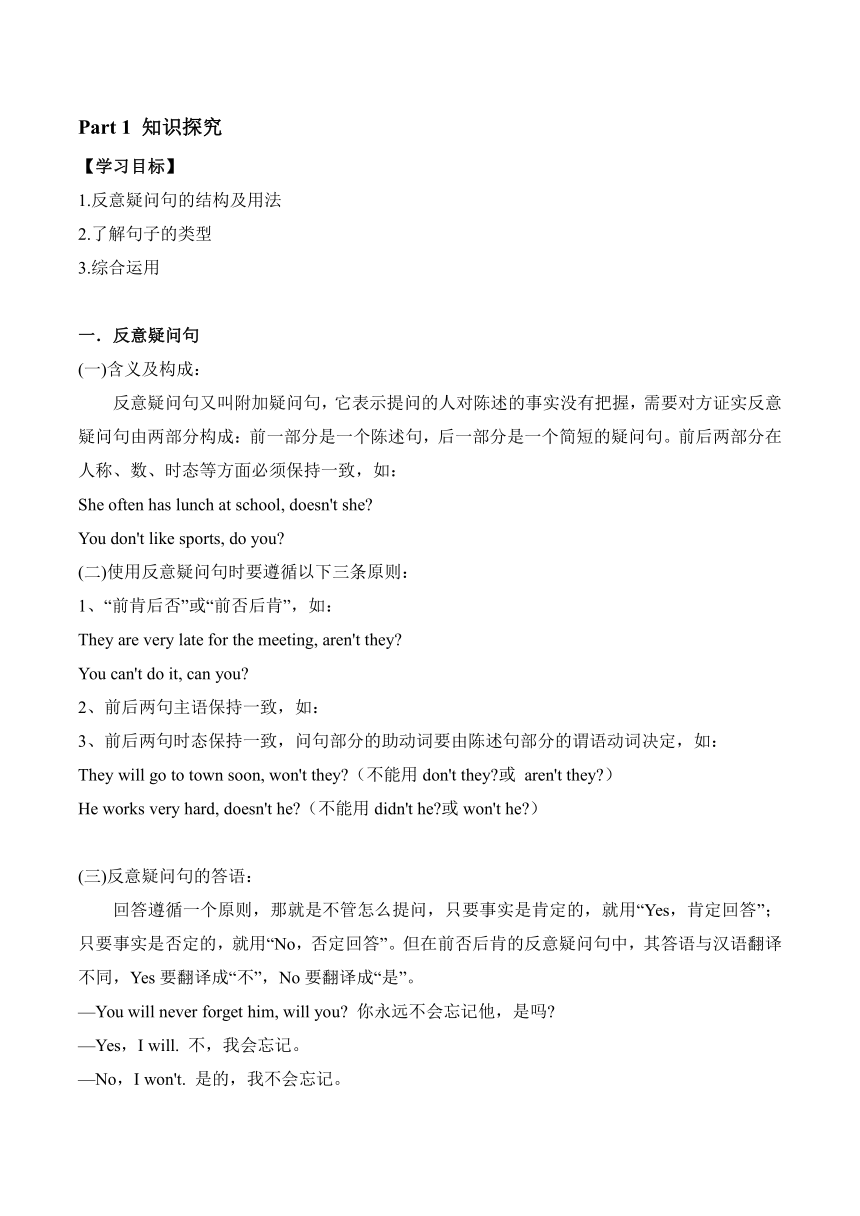 | |
| 格式 | zip | ||
| 文件大小 | 62.6KB | ||
| 资源类型 | 教案 | ||
| 版本资源 | 牛津深圳版 | ||
| 科目 | 英语 | ||
| 更新时间 | 2022-09-22 08:05:49 | ||
图片预览

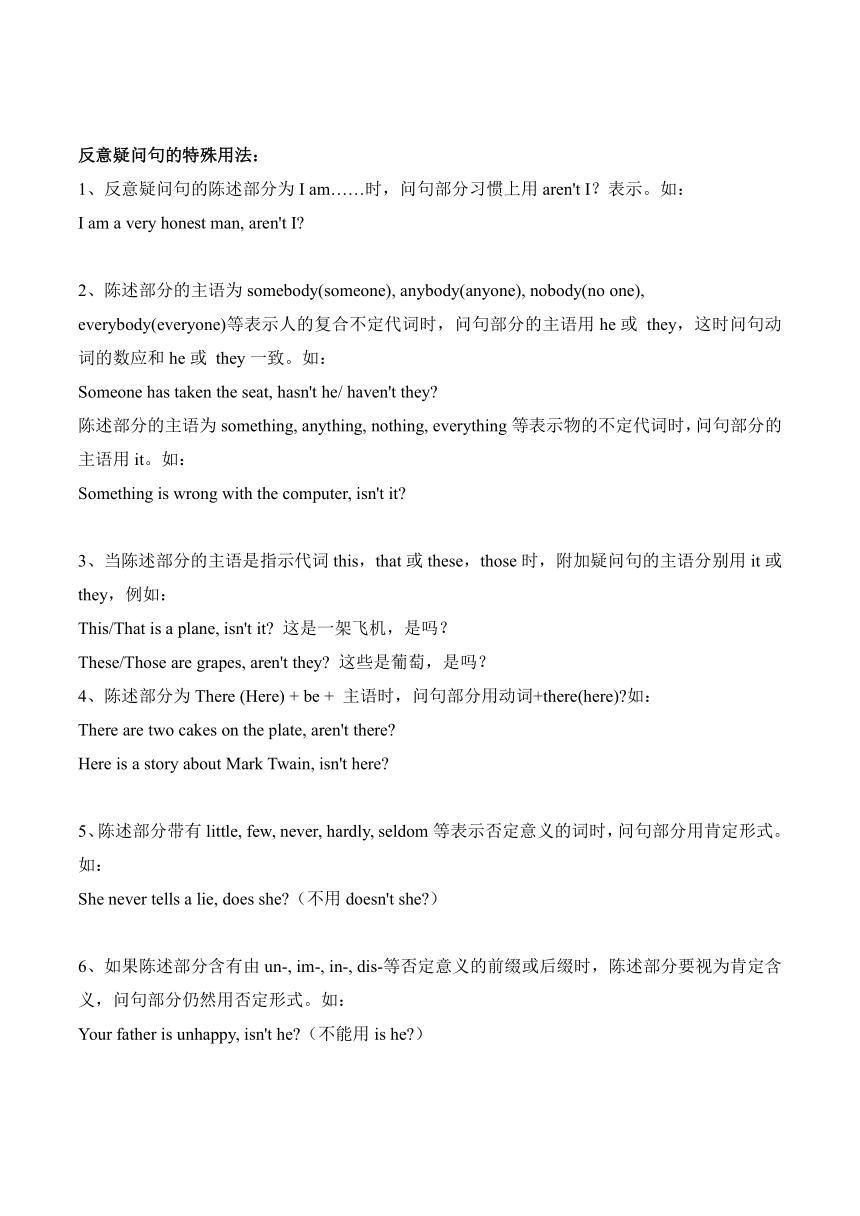
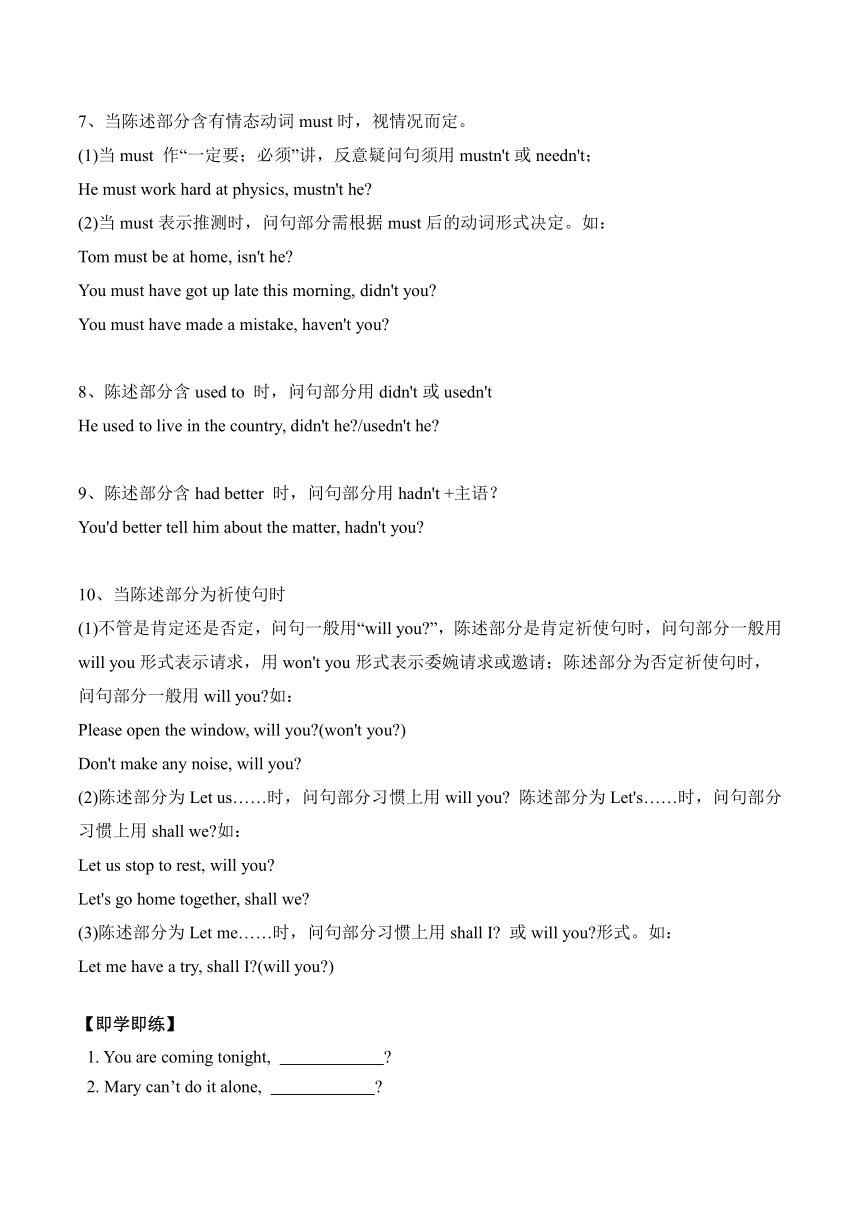
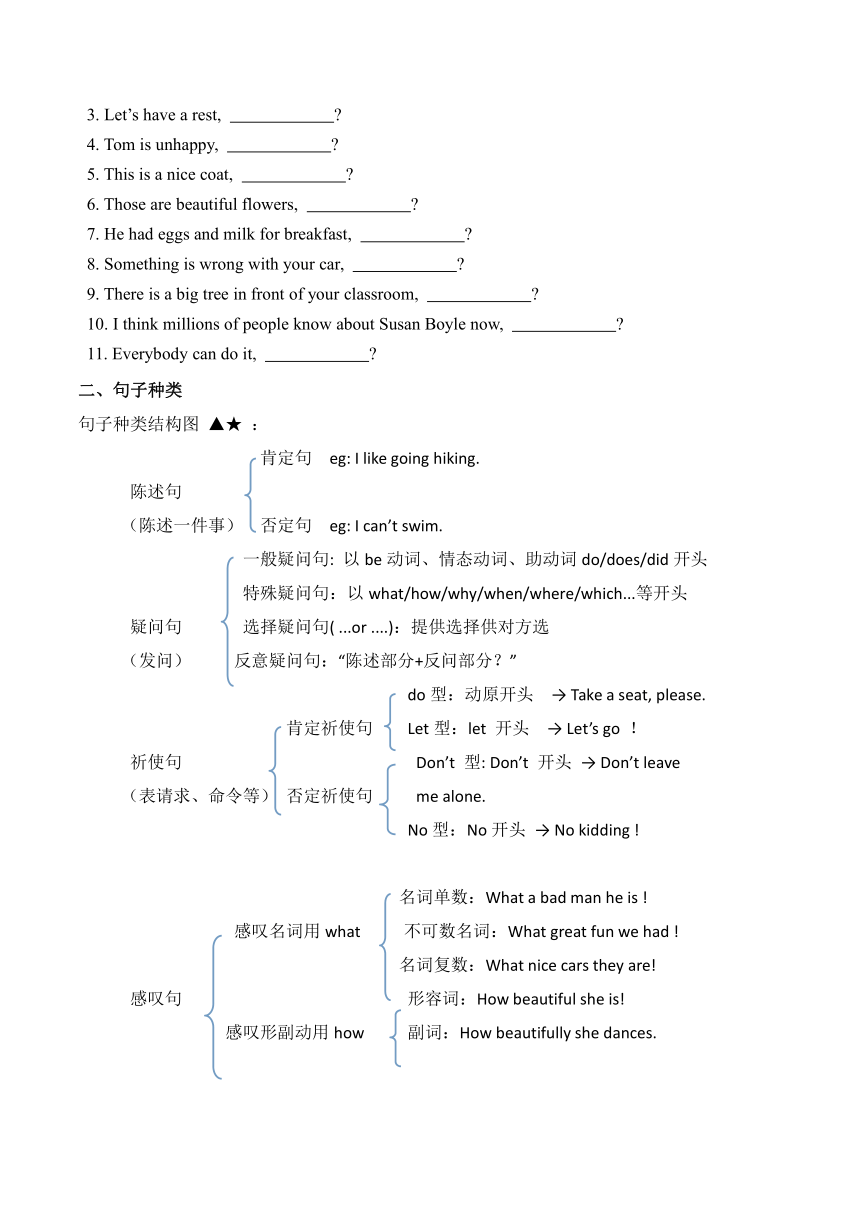
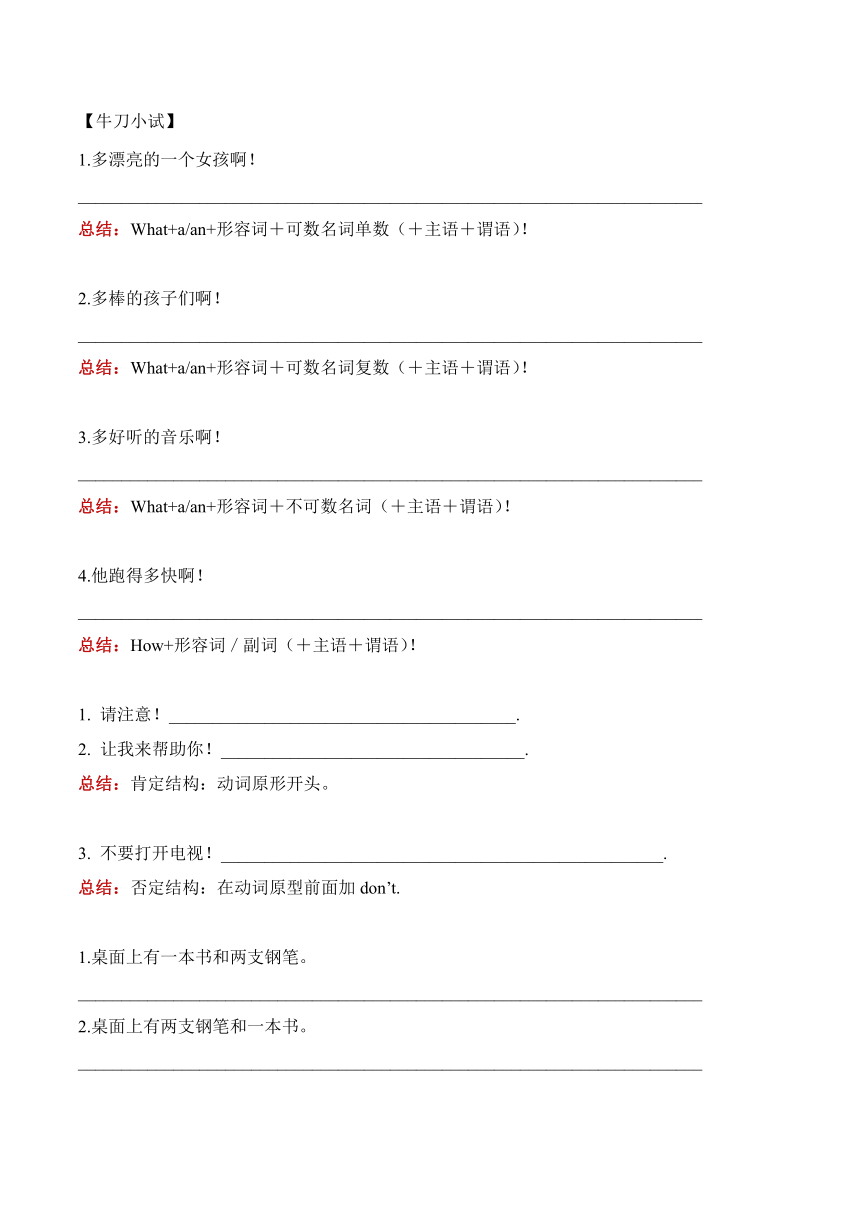
文档简介
Part 1 知识探究
【学习目标】
1.反意疑问句的结构及用法
2.了解句子的类型
3.综合运用
一.反意疑问句
(一)含义及构成:
反意疑问句又叫附加疑问句,它表示提问的人对陈述的事实没有把握,需要对方证实反意疑问句由两部分构成:前一部分是一个陈述句,后一部分是一个简短的疑问句。前后两部分在人称、数、时态等方面必须保持一致,如:
She often has lunch at school, doesn't she
You don't like sports, do you
(二)使用反意疑问句时要遵循以下三条原则:
1、“前肯后否”或“前否后肯”,如:
They are very late for the meeting, aren't they
You can't do it, can you
2、前后两句主语保持一致,如:
3、前后两句时态保持一致,问句部分的助动词要由陈述句部分的谓语动词决定,如:
They will go to town soon, won't they (不能用don't they 或 aren't they )
He works very hard, doesn't he (不能用didn't he 或won't he )
(三)反意疑问句的答语:
回答遵循一个原则,那就是不管怎么提问,只要事实是肯定的,就用“Yes,肯定回答”;只要事实是否定的,就用“No,否定回答”。但在前否后肯的反意疑问句中,其答语与汉语翻译不同,Yes要翻译成“不”,No要翻译成“是”。
—You will never forget him, will you 你永远不会忘记他,是吗
—Yes,I will. 不,我会忘记。
—No,I won't. 是的,我不会忘记。
反意疑问句的特殊用法:
1、反意疑问句的陈述部分为I am……时,问句部分习惯上用aren't I?表示。如:
I am a very honest man, aren't I
2、陈述部分的主语为somebody(someone), anybody(anyone), nobody(no one),
everybody(everyone)等表示人的复合不定代词时,问句部分的主语用he或 they,这时问句动词的数应和he或 they一致。如:
Someone has taken the seat, hasn't he/ haven't they
陈述部分的主语为something, anything, nothing, everything等表示物的不定代词时,问句部分的主语用it。如:
Something is wrong with the computer, isn't it
3、当陈述部分的主语是指示代词this,that或these,those时,附加疑问句的主语分别用it或they,例如:
This/That is a plane, isn't it 这是一架飞机,是吗?
These/Those are grapes, aren't they 这些是葡萄,是吗?
4、陈述部分为There (Here) + be + 主语时,问句部分用动词+there(here) 如:
There are two cakes on the plate, aren't there
Here is a story about Mark Twain, isn't here
5、陈述部分带有little, few, never, hardly, seldom等表示否定意义的词时,问句部分用肯定形式。如:
She never tells a lie, does she (不用doesn't she )
6、如果陈述部分含有由un-, im-, in-, dis-等否定意义的前缀或后缀时,陈述部分要视为肯定含义,问句部分仍然用否定形式。如:
Your father is unhappy, isn't he (不能用is he )
7、当陈述部分含有情态动词must时,视情况而定。
(1)当must 作“一定要;必须”讲,反意疑问句须用mustn't或needn't;
He must work hard at physics, mustn't he
(2)当must表示推测时,问句部分需根据must后的动词形式决定。如:
Tom must be at home, isn't he
You must have got up late this morning, didn't you
You must have made a mistake, haven't you
8、陈述部分含used to 时,问句部分用didn't或usedn't
He used to live in the country, didn't he /usedn't he
9、陈述部分含had better 时,问句部分用hadn't +主语?
You'd better tell him about the matter, hadn't you
10、当陈述部分为祈使句时
(1)不管是肯定还是否定,问句一般用“will you ”,陈述部分是肯定祈使句时,问句部分一般用will you形式表示请求,用won't you形式表示委婉请求或邀请;陈述部分为否定祈使句时,
问句部分一般用will you 如:
Please open the window, will you (won't you )
Don't make any noise, will you
(2)陈述部分为Let us……时,问句部分习惯上用will you 陈述部分为Let's……时,问句部分习惯上用shall we 如:
Let us stop to rest, will you
Let's go home together, shall we
(3)陈述部分为Let me……时,问句部分习惯上用shall I 或will you 形式。如:
Let me have a try, shall I (will you )
【即学即练】
1. You are coming tonight,
2. Mary can’t do it alone,
3. Let’s have a rest,
4. Tom is unhappy,
5. This is a nice coat,
6. Those are beautiful flowers,
7. He had eggs and milk for breakfast,
8. Something is wrong with your car,
9. There is a big tree in front of your classroom,
10. I think millions of people know about Susan Boyle now,
11. Everybody can do it,
二、句子种类
句子种类结构图 ▲★ :
肯定句 eg: I like going hiking.
陈述句
(陈述一件事) 否定句 eg: I can’t swim.
一般疑问句: 以be动词、情态动词、助动词do/does/did开头
特殊疑问句:以what/how/why/when/where/which...等开头
疑问句 选择疑问句( ...or ....):提供选择供对方选
(发问) 反意疑问句:“陈述部分+反问部分?”
do型:动原开头 → Take a seat, please.
肯定祈使句 Let型:let 开头 → Let’s go !
祈使句 Don’t 型: Don’t 开头 → Don’t leave
(表请求、命令等) 否定祈使句 me alone.
No型:No开头 → No kidding !
名词单数:What a bad man he is !
感叹名词用what 不可数名词:What great fun we had !
名词复数:What nice cars they are!
感叹句 形容词:How beautiful she is!
感叹形副动用how 副词:How beautifully she dances.
【牛刀小试】
1.多漂亮的一个女孩啊!
________________________________________________________________________
总结:What+a/an+形容词+可数名词单数(+主语+谓语)!
2.多棒的孩子们啊!
________________________________________________________________________
总结:What+a/an+形容词+可数名词复数(+主语+谓语)!
3.多好听的音乐啊!
________________________________________________________________________
总结:What+a/an+形容词+不可数名词(+主语+谓语)!
4.他跑得多快啊!
________________________________________________________________________
总结:How+形容词/副词(+主语+谓语)!
请注意!________________________________________.
让我来帮助你!___________________________________.
总结:肯定结构:动词原形开头。
不要打开电视!___________________________________________________.
总结:否定结构:在动词原型前面加don’t.
1.桌面上有一本书和两支钢笔。
________________________________________________________________________
2.桌面上有两支钢笔和一本书。
________________________________________________________________________
3.这个花园很快就会有更多的树。
________________________________________________________________________
能力提升
一、完成句子
1.下周我们学校将有一场才艺表演。
_____________ ______________ _______________a talent show in our school next week.
2.沿着古老的丝绸之路旅行是一次多么有趣的经历啊!
_____________ ______________ _____________experience it is to travel along the old Silk Road!
3.你们自己算出了这道数学题。你们是多么聪明的孩子啊!
You've worked out the maths problem by yourselves._____________ ______________children you are!
4.这部电影真乏味!我都快睡着了。
_____________ ______________ ______________movie it is! I almost fall asleep.
5.初三功课太多,因此许多学生几乎没有时间做运动。
_____________ ______________too much homework in Grade Nine,so many students have little time to do sports.
6.迈克尔·杰克逊跳舞跳得多好啊!很多人对他很疯狂。
_____________ ______________Michael Jackson dances! Many people are crazy about him.
7.现在广州的房价涨得真快!
_____________ ______________the price of houses in Guangzhou is rising!
【当堂测试】
一.单项选择
1. We do morning exercises in the morning, ___________
A. do we B. did we C. didn't we D. don't we
2. She doesn't care for a car, ___________
A. is she B. does she C. doesn't she D. did she
3. She has a brother, ___________
A. doesn't she B. has she C. don't she D. does she
4. She will have lunch at school, ___________
A. doesn't she B. won't she C. is she D. will she
5. He was late for school that morning, ___________
A. wasn't he B. was he C. did he D. didn't he
6. His sister had a bad cough, ___________ she
A. wasn't B. doesn't C. hadn't D. didn't
7. Nobody says a word about the incident, ___________
A. is he B. doesn't he C. do they D. don't they
8. Nothing he did was right, ___________
A. did he B. was it C. didn't it D. was he
9. There is not much news in today's paper, _____________
A. isn't it B. are there C. is there D. aren't there
10. You never told me why you were late for the class, ___________
A. weren't you B. didn't you C. had you D. did you
11. He must be in the library now, ________
A. doesn't he B. mustn't he C. needn't he D. isn't he
12. She must have arrived there yesterday, _________
A. have she B. must she C. didn't she D. mustn't she
13. There used to be a church behind the cemetery, ________
A. didn't there B. used there C. usedn't it D. didn't it
14. My sister often needs help with her study, _______
A. need she B. needn't she C. does she D. doesn't she
15. They dare not call you a fool, ___________
A. would they B. dared they C. dares they D. dare they
16. What a lovely day, _________
A. doesn't it B. isn't it C. didn't it D. hasn't it
17. Let me do it, _______
A. shall I B. shall we C. will you D. will I
18. He dislikes the two subjects, _______ he
A. does B. doesn't C. is D. isn't
19. Let's go there by bus, _______
A. will you B. shall we C. don't you D. will you
20. Let us go to play football, _______
A. will you B. shall we C. do we D. are we
Part 2 综合提升
【1】
One evening, I went out for a walk on the path near my house with my husband. I wore a ring 1 a beautiful diamond. It was a special ring 2 my grandmother gave me for my 23rd birthday. At the end of the path, 3 I looked down at it again, I found the diamond was missing. I started back to look for the tiny stone. In my heart, I knew 4 seemed impossible to find it. The path was long and covered with leaves. As I 5 the ground, I met an old lady. “What’s the matter, love ” She asked. I explained about the missing diamond of my ring. She said, “Tell me 6 , love, I walk along this path every day, and I’ll keep my eyes 7 for it.” I thanked her and thought it couldn’t 8 .
A few days later, my husband and I met 9 old lady on the path. “Guess what ” She said, “IT found your diamond!” To our 10 , she’d found the tiny stone and was willing to hand it back to me.” 11 lucky it was for me to find it!” When we provided her with some money, she refused 12 . I was so moved. She could have kept the diamond, or sold it for it’s worth 13 dollars, but she didn’t.
Every time I look at may ring and remind 14 there are kind and beautiful hearts in the world. And I’ll spend the rest of my life 15 to do something like that.
1.A.on B.in C.at D.with
2.A.who B.whom C.at which D.where
3.A.before B.when C.since D.if
4.A.it B.that C.this D.there
5.A.search B.would search C.am searching D.was searching
6.A.what is it like B.what it is like C.what was it like D.what it was like
7.A.open B.opening C.opened D.opens
8.A.find B.was finding C.be found D.was found
9.A.a B.an C.the D./
10.A.surprise B.surprised C.surprising D.surprisingly
11.A.What B.How C.What a D.How a
12.A.polite B.politely C.more polite D.more politely
13.A.several thousand B.several thousands
C.several thousands of D.several thousand of
14.A.I B.me C.mine D.myself
15.A.try B.to try C.tried D.Trying
【2】
At the age of 16, Einstein always played with a group of crazy kids. Because he was so busy 16 , he didn’t study 17 and failed his final exam.
One morning, when Einstein 18 a fishing tool and was about to go fishing with his friends, his father stopped 19 and said seriously, “Einstein, you’re 20 crazy about playing that you failed your exam. I’m worried about your future.”
“ 21 are you worrying about Jack and Robert also failed, but 22 they still go fishing ”
“My boy, there is 23 story that people tell in our hometown. Listen to it now.”
“There were two cats playing on the top of a house. One cat was careless and fell down the chimney(烟囱)while 24 the other cat. When the two cats climbed out 25 the chimney, one of the cats had soot(烟灰)on his face, while the other cat’s face was clean. Seeing the soot-faced cat, the clean cat thought its face 26 be dirty, so it quickly ran to the riverside and washed its face. The soot-faced cat saw the clean-faced cat 27 thought its face was also clean, so it just walked down the street happily.”
“Einstein, no one can be your mirror. You have to think for yourself. 28 you follow others, you will never learn.”
Hearing this, Einstein laid down his fishing tool and returned to his room. He studied hard and didn’t follow 29 from then on. This helped him 30 successful.
16.A.play B.to play C.playing D.played
17.A.hard enough B.enough hard C.hardly enough D.enough hardly
18.A.is holding B.holds C.was holding D.held
19.A.he B.him C.his D.himself
20.A.such B.as C.so D.such a
21.A.What B.When C.Who D.Why
22.A.do B.did C.didn't D.don't
23.A.the B.a C.an D./
24.A.holds B.to hold C.holding D.held
25.A.behind B.of C.among D.between
26.A.can B.may C.must D.might
27.A.but B.so C.or D.and
28.A.If B.Unless C.Although D.Though
29.A.the others B.other C.others D.another
30.A.is B.being C.was D.be
【3】
A blind boy sat on the steps of a building with a hat by his feet. He held up a sign which said: “I am blind, please help.” There were not 31 coins in the hat.
A man was walking by. He took a few coins 32 his pocket and dropped them into the hat. He then took the sign, turned it around, and wrote some words. He put the sign back so that 33 who walked by would see the new words.
Soon the hat 34 with coins. A lot more people were giving money to the blind boy. That afternoon the man who had changed the sign came to see how things were. The boy recognized his footsteps and asked, “Were you the one 35 changed my sign this morning What did you write ” The man said, “I only wrote the 36 . I said what you said, 37 in a different way. I wrote: ‘Today is a beautiful day, but I cannot see it.’”
38 signs told people that the boy was blind. But the first sign simply said the boy was blind. The second sign told people that they were 39 lucky that they were not blind. Should we be 40 that the second sign was more effective
Moral of the Story:
Be thankful for what you have. Be creative. Think 41 and positively. When life gives you 100 reasons to cry, 42 life that you have 1000 reasons to smile.
Face your past without regret. Handle your present with confidence. Prepare for the future without fear. Keep the faith and drop the fear.
The most beautiful thing is 43 a person smiling. And even 44 is, knowing that you are 45 reason behind it!
31.A.much B.little C.many D.few
32.A.in B.through C.from D.to
33.A.something B.nobody C.anything D.everyone
34.A.filled B.was filled C.had filled D.was filling
35.A.who B.which C.what D.whom
36.A.true B.truth C.truly D.truer
37.A.but B.and C.so D.or
38.A.Either B.Neither C.Both D.All
39.A.too B.just C.almost D.so
40.A.surprise B.surprised C.surprising D.surprisingly
41.A.different B.difference C.differently D.differ
42.A.show B.to show C.showing D.shows
43.A.sees B.saw C.seen D.to see
44.A.beautiful B.more beautiful C.most beautiful D.beautifully
45.A.a B.an C./ D.the
Part 3 课后作业
It rained last night, _________________ it
Tony can't speak Japanese, _________________ he
Tom and Jim are from America, ___________________ they
总结:如陈述部分为肯定式,疑问部分用否定式。反之,如陈述部分否定式,疑问部分用肯定式。
She has two pens and a pencil , __________________
Tom had to go home before 9:00 last night, ___________________
The Greens have been to China many times, _____________________
总结:当陈述句部分含实义动词have/has/had 时, 反意疑问句部分通常要用do/does/did的相应形式;如陈述句部分含助动词have/has/had 时,反意疑问句部分通常要用have/has/had的相应形式。
She has few friends ,__________________
Tom hardly goes home until 9:00 ,____________________
The Greens have never been to China before,_______________________
总结:当陈述句部分含有no/nothing/nobody/never/few/hardly/seldom等否定词时, 反意疑问句部分通常要视为肯定。
It’s impossible for him to make such a mistake,__________________
Tom is an impolite boy,___________________
Your brother looks unhappy,_____________________
总结:当陈述句部分含有un-/in-/im-/dis-等否定词缀时, 陈述句部分不能视为否定,仍然遵循“前肯后否”。
There are two tress in front of your house,____________________
There wasn't an exciting football game last night,______________________
总结:当陈述句部分为there be句型时, 疑问句部分由“be / be not + there”构成。
Mr Green, let us have a rest ,__________________
Let's go fishing tomorrow, ________________
总结:当陈述句部分为let us(不包括听话人在内)时, 疑问句部分由“will you”构成;当陈述句部分为let's(包括听话人在内)时, 疑问句部分由“shall we”构成。
Don't open the window , _________________________
Please be quiet, __________________________
总结:当陈述句部分为祈使句时, 疑问句部分一律由“will you”构成;
完成下列反意疑问句
(1).She has gone to town,________________________
(2).You like it,__________________________
(3).You come from Beijing, __________________________
(4).This is a plane, ______________________________
(5). Lucy and Lily can speak Chinese,____________________________?
(6). Sam didn't go to yesterday, __________________________________
(7). Mary has never been to China before,_____________________________
(8).There are 55 students in your class, ______________________________
【学习目标】
1.反意疑问句的结构及用法
2.了解句子的类型
3.综合运用
一.反意疑问句
(一)含义及构成:
反意疑问句又叫附加疑问句,它表示提问的人对陈述的事实没有把握,需要对方证实反意疑问句由两部分构成:前一部分是一个陈述句,后一部分是一个简短的疑问句。前后两部分在人称、数、时态等方面必须保持一致,如:
She often has lunch at school, doesn't she
You don't like sports, do you
(二)使用反意疑问句时要遵循以下三条原则:
1、“前肯后否”或“前否后肯”,如:
They are very late for the meeting, aren't they
You can't do it, can you
2、前后两句主语保持一致,如:
3、前后两句时态保持一致,问句部分的助动词要由陈述句部分的谓语动词决定,如:
They will go to town soon, won't they (不能用don't they 或 aren't they )
He works very hard, doesn't he (不能用didn't he 或won't he )
(三)反意疑问句的答语:
回答遵循一个原则,那就是不管怎么提问,只要事实是肯定的,就用“Yes,肯定回答”;只要事实是否定的,就用“No,否定回答”。但在前否后肯的反意疑问句中,其答语与汉语翻译不同,Yes要翻译成“不”,No要翻译成“是”。
—You will never forget him, will you 你永远不会忘记他,是吗
—Yes,I will. 不,我会忘记。
—No,I won't. 是的,我不会忘记。
反意疑问句的特殊用法:
1、反意疑问句的陈述部分为I am……时,问句部分习惯上用aren't I?表示。如:
I am a very honest man, aren't I
2、陈述部分的主语为somebody(someone), anybody(anyone), nobody(no one),
everybody(everyone)等表示人的复合不定代词时,问句部分的主语用he或 they,这时问句动词的数应和he或 they一致。如:
Someone has taken the seat, hasn't he/ haven't they
陈述部分的主语为something, anything, nothing, everything等表示物的不定代词时,问句部分的主语用it。如:
Something is wrong with the computer, isn't it
3、当陈述部分的主语是指示代词this,that或these,those时,附加疑问句的主语分别用it或they,例如:
This/That is a plane, isn't it 这是一架飞机,是吗?
These/Those are grapes, aren't they 这些是葡萄,是吗?
4、陈述部分为There (Here) + be + 主语时,问句部分用动词+there(here) 如:
There are two cakes on the plate, aren't there
Here is a story about Mark Twain, isn't here
5、陈述部分带有little, few, never, hardly, seldom等表示否定意义的词时,问句部分用肯定形式。如:
She never tells a lie, does she (不用doesn't she )
6、如果陈述部分含有由un-, im-, in-, dis-等否定意义的前缀或后缀时,陈述部分要视为肯定含义,问句部分仍然用否定形式。如:
Your father is unhappy, isn't he (不能用is he )
7、当陈述部分含有情态动词must时,视情况而定。
(1)当must 作“一定要;必须”讲,反意疑问句须用mustn't或needn't;
He must work hard at physics, mustn't he
(2)当must表示推测时,问句部分需根据must后的动词形式决定。如:
Tom must be at home, isn't he
You must have got up late this morning, didn't you
You must have made a mistake, haven't you
8、陈述部分含used to 时,问句部分用didn't或usedn't
He used to live in the country, didn't he /usedn't he
9、陈述部分含had better 时,问句部分用hadn't +主语?
You'd better tell him about the matter, hadn't you
10、当陈述部分为祈使句时
(1)不管是肯定还是否定,问句一般用“will you ”,陈述部分是肯定祈使句时,问句部分一般用will you形式表示请求,用won't you形式表示委婉请求或邀请;陈述部分为否定祈使句时,
问句部分一般用will you 如:
Please open the window, will you (won't you )
Don't make any noise, will you
(2)陈述部分为Let us……时,问句部分习惯上用will you 陈述部分为Let's……时,问句部分习惯上用shall we 如:
Let us stop to rest, will you
Let's go home together, shall we
(3)陈述部分为Let me……时,问句部分习惯上用shall I 或will you 形式。如:
Let me have a try, shall I (will you )
【即学即练】
1. You are coming tonight,
2. Mary can’t do it alone,
3. Let’s have a rest,
4. Tom is unhappy,
5. This is a nice coat,
6. Those are beautiful flowers,
7. He had eggs and milk for breakfast,
8. Something is wrong with your car,
9. There is a big tree in front of your classroom,
10. I think millions of people know about Susan Boyle now,
11. Everybody can do it,
二、句子种类
句子种类结构图 ▲★ :
肯定句 eg: I like going hiking.
陈述句
(陈述一件事) 否定句 eg: I can’t swim.
一般疑问句: 以be动词、情态动词、助动词do/does/did开头
特殊疑问句:以what/how/why/when/where/which...等开头
疑问句 选择疑问句( ...or ....):提供选择供对方选
(发问) 反意疑问句:“陈述部分+反问部分?”
do型:动原开头 → Take a seat, please.
肯定祈使句 Let型:let 开头 → Let’s go !
祈使句 Don’t 型: Don’t 开头 → Don’t leave
(表请求、命令等) 否定祈使句 me alone.
No型:No开头 → No kidding !
名词单数:What a bad man he is !
感叹名词用what 不可数名词:What great fun we had !
名词复数:What nice cars they are!
感叹句 形容词:How beautiful she is!
感叹形副动用how 副词:How beautifully she dances.
【牛刀小试】
1.多漂亮的一个女孩啊!
________________________________________________________________________
总结:What+a/an+形容词+可数名词单数(+主语+谓语)!
2.多棒的孩子们啊!
________________________________________________________________________
总结:What+a/an+形容词+可数名词复数(+主语+谓语)!
3.多好听的音乐啊!
________________________________________________________________________
总结:What+a/an+形容词+不可数名词(+主语+谓语)!
4.他跑得多快啊!
________________________________________________________________________
总结:How+形容词/副词(+主语+谓语)!
请注意!________________________________________.
让我来帮助你!___________________________________.
总结:肯定结构:动词原形开头。
不要打开电视!___________________________________________________.
总结:否定结构:在动词原型前面加don’t.
1.桌面上有一本书和两支钢笔。
________________________________________________________________________
2.桌面上有两支钢笔和一本书。
________________________________________________________________________
3.这个花园很快就会有更多的树。
________________________________________________________________________
能力提升
一、完成句子
1.下周我们学校将有一场才艺表演。
_____________ ______________ _______________a talent show in our school next week.
2.沿着古老的丝绸之路旅行是一次多么有趣的经历啊!
_____________ ______________ _____________experience it is to travel along the old Silk Road!
3.你们自己算出了这道数学题。你们是多么聪明的孩子啊!
You've worked out the maths problem by yourselves._____________ ______________children you are!
4.这部电影真乏味!我都快睡着了。
_____________ ______________ ______________movie it is! I almost fall asleep.
5.初三功课太多,因此许多学生几乎没有时间做运动。
_____________ ______________too much homework in Grade Nine,so many students have little time to do sports.
6.迈克尔·杰克逊跳舞跳得多好啊!很多人对他很疯狂。
_____________ ______________Michael Jackson dances! Many people are crazy about him.
7.现在广州的房价涨得真快!
_____________ ______________the price of houses in Guangzhou is rising!
【当堂测试】
一.单项选择
1. We do morning exercises in the morning, ___________
A. do we B. did we C. didn't we D. don't we
2. She doesn't care for a car, ___________
A. is she B. does she C. doesn't she D. did she
3. She has a brother, ___________
A. doesn't she B. has she C. don't she D. does she
4. She will have lunch at school, ___________
A. doesn't she B. won't she C. is she D. will she
5. He was late for school that morning, ___________
A. wasn't he B. was he C. did he D. didn't he
6. His sister had a bad cough, ___________ she
A. wasn't B. doesn't C. hadn't D. didn't
7. Nobody says a word about the incident, ___________
A. is he B. doesn't he C. do they D. don't they
8. Nothing he did was right, ___________
A. did he B. was it C. didn't it D. was he
9. There is not much news in today's paper, _____________
A. isn't it B. are there C. is there D. aren't there
10. You never told me why you were late for the class, ___________
A. weren't you B. didn't you C. had you D. did you
11. He must be in the library now, ________
A. doesn't he B. mustn't he C. needn't he D. isn't he
12. She must have arrived there yesterday, _________
A. have she B. must she C. didn't she D. mustn't she
13. There used to be a church behind the cemetery, ________
A. didn't there B. used there C. usedn't it D. didn't it
14. My sister often needs help with her study, _______
A. need she B. needn't she C. does she D. doesn't she
15. They dare not call you a fool, ___________
A. would they B. dared they C. dares they D. dare they
16. What a lovely day, _________
A. doesn't it B. isn't it C. didn't it D. hasn't it
17. Let me do it, _______
A. shall I B. shall we C. will you D. will I
18. He dislikes the two subjects, _______ he
A. does B. doesn't C. is D. isn't
19. Let's go there by bus, _______
A. will you B. shall we C. don't you D. will you
20. Let us go to play football, _______
A. will you B. shall we C. do we D. are we
Part 2 综合提升
【1】
One evening, I went out for a walk on the path near my house with my husband. I wore a ring 1 a beautiful diamond. It was a special ring 2 my grandmother gave me for my 23rd birthday. At the end of the path, 3 I looked down at it again, I found the diamond was missing. I started back to look for the tiny stone. In my heart, I knew 4 seemed impossible to find it. The path was long and covered with leaves. As I 5 the ground, I met an old lady. “What’s the matter, love ” She asked. I explained about the missing diamond of my ring. She said, “Tell me 6 , love, I walk along this path every day, and I’ll keep my eyes 7 for it.” I thanked her and thought it couldn’t 8 .
A few days later, my husband and I met 9 old lady on the path. “Guess what ” She said, “IT found your diamond!” To our 10 , she’d found the tiny stone and was willing to hand it back to me.” 11 lucky it was for me to find it!” When we provided her with some money, she refused 12 . I was so moved. She could have kept the diamond, or sold it for it’s worth 13 dollars, but she didn’t.
Every time I look at may ring and remind 14 there are kind and beautiful hearts in the world. And I’ll spend the rest of my life 15 to do something like that.
1.A.on B.in C.at D.with
2.A.who B.whom C.at which D.where
3.A.before B.when C.since D.if
4.A.it B.that C.this D.there
5.A.search B.would search C.am searching D.was searching
6.A.what is it like B.what it is like C.what was it like D.what it was like
7.A.open B.opening C.opened D.opens
8.A.find B.was finding C.be found D.was found
9.A.a B.an C.the D./
10.A.surprise B.surprised C.surprising D.surprisingly
11.A.What B.How C.What a D.How a
12.A.polite B.politely C.more polite D.more politely
13.A.several thousand B.several thousands
C.several thousands of D.several thousand of
14.A.I B.me C.mine D.myself
15.A.try B.to try C.tried D.Trying
【2】
At the age of 16, Einstein always played with a group of crazy kids. Because he was so busy 16 , he didn’t study 17 and failed his final exam.
One morning, when Einstein 18 a fishing tool and was about to go fishing with his friends, his father stopped 19 and said seriously, “Einstein, you’re 20 crazy about playing that you failed your exam. I’m worried about your future.”
“ 21 are you worrying about Jack and Robert also failed, but 22 they still go fishing ”
“My boy, there is 23 story that people tell in our hometown. Listen to it now.”
“There were two cats playing on the top of a house. One cat was careless and fell down the chimney(烟囱)while 24 the other cat. When the two cats climbed out 25 the chimney, one of the cats had soot(烟灰)on his face, while the other cat’s face was clean. Seeing the soot-faced cat, the clean cat thought its face 26 be dirty, so it quickly ran to the riverside and washed its face. The soot-faced cat saw the clean-faced cat 27 thought its face was also clean, so it just walked down the street happily.”
“Einstein, no one can be your mirror. You have to think for yourself. 28 you follow others, you will never learn.”
Hearing this, Einstein laid down his fishing tool and returned to his room. He studied hard and didn’t follow 29 from then on. This helped him 30 successful.
16.A.play B.to play C.playing D.played
17.A.hard enough B.enough hard C.hardly enough D.enough hardly
18.A.is holding B.holds C.was holding D.held
19.A.he B.him C.his D.himself
20.A.such B.as C.so D.such a
21.A.What B.When C.Who D.Why
22.A.do B.did C.didn't D.don't
23.A.the B.a C.an D./
24.A.holds B.to hold C.holding D.held
25.A.behind B.of C.among D.between
26.A.can B.may C.must D.might
27.A.but B.so C.or D.and
28.A.If B.Unless C.Although D.Though
29.A.the others B.other C.others D.another
30.A.is B.being C.was D.be
【3】
A blind boy sat on the steps of a building with a hat by his feet. He held up a sign which said: “I am blind, please help.” There were not 31 coins in the hat.
A man was walking by. He took a few coins 32 his pocket and dropped them into the hat. He then took the sign, turned it around, and wrote some words. He put the sign back so that 33 who walked by would see the new words.
Soon the hat 34 with coins. A lot more people were giving money to the blind boy. That afternoon the man who had changed the sign came to see how things were. The boy recognized his footsteps and asked, “Were you the one 35 changed my sign this morning What did you write ” The man said, “I only wrote the 36 . I said what you said, 37 in a different way. I wrote: ‘Today is a beautiful day, but I cannot see it.’”
38 signs told people that the boy was blind. But the first sign simply said the boy was blind. The second sign told people that they were 39 lucky that they were not blind. Should we be 40 that the second sign was more effective
Moral of the Story:
Be thankful for what you have. Be creative. Think 41 and positively. When life gives you 100 reasons to cry, 42 life that you have 1000 reasons to smile.
Face your past without regret. Handle your present with confidence. Prepare for the future without fear. Keep the faith and drop the fear.
The most beautiful thing is 43 a person smiling. And even 44 is, knowing that you are 45 reason behind it!
31.A.much B.little C.many D.few
32.A.in B.through C.from D.to
33.A.something B.nobody C.anything D.everyone
34.A.filled B.was filled C.had filled D.was filling
35.A.who B.which C.what D.whom
36.A.true B.truth C.truly D.truer
37.A.but B.and C.so D.or
38.A.Either B.Neither C.Both D.All
39.A.too B.just C.almost D.so
40.A.surprise B.surprised C.surprising D.surprisingly
41.A.different B.difference C.differently D.differ
42.A.show B.to show C.showing D.shows
43.A.sees B.saw C.seen D.to see
44.A.beautiful B.more beautiful C.most beautiful D.beautifully
45.A.a B.an C./ D.the
Part 3 课后作业
It rained last night, _________________ it
Tony can't speak Japanese, _________________ he
Tom and Jim are from America, ___________________ they
总结:如陈述部分为肯定式,疑问部分用否定式。反之,如陈述部分否定式,疑问部分用肯定式。
She has two pens and a pencil , __________________
Tom had to go home before 9:00 last night, ___________________
The Greens have been to China many times, _____________________
总结:当陈述句部分含实义动词have/has/had 时, 反意疑问句部分通常要用do/does/did的相应形式;如陈述句部分含助动词have/has/had 时,反意疑问句部分通常要用have/has/had的相应形式。
She has few friends ,__________________
Tom hardly goes home until 9:00 ,____________________
The Greens have never been to China before,_______________________
总结:当陈述句部分含有no/nothing/nobody/never/few/hardly/seldom等否定词时, 反意疑问句部分通常要视为肯定。
It’s impossible for him to make such a mistake,__________________
Tom is an impolite boy,___________________
Your brother looks unhappy,_____________________
总结:当陈述句部分含有un-/in-/im-/dis-等否定词缀时, 陈述句部分不能视为否定,仍然遵循“前肯后否”。
There are two tress in front of your house,____________________
There wasn't an exciting football game last night,______________________
总结:当陈述句部分为there be句型时, 疑问句部分由“be / be not + there”构成。
Mr Green, let us have a rest ,__________________
Let's go fishing tomorrow, ________________
总结:当陈述句部分为let us(不包括听话人在内)时, 疑问句部分由“will you”构成;当陈述句部分为let's(包括听话人在内)时, 疑问句部分由“shall we”构成。
Don't open the window , _________________________
Please be quiet, __________________________
总结:当陈述句部分为祈使句时, 疑问句部分一律由“will you”构成;
完成下列反意疑问句
(1).She has gone to town,________________________
(2).You like it,__________________________
(3).You come from Beijing, __________________________
(4).This is a plane, ______________________________
(5). Lucy and Lily can speak Chinese,____________________________?
(6). Sam didn't go to yesterday, __________________________________
(7). Mary has never been to China before,_____________________________
(8).There are 55 students in your class, ______________________________
